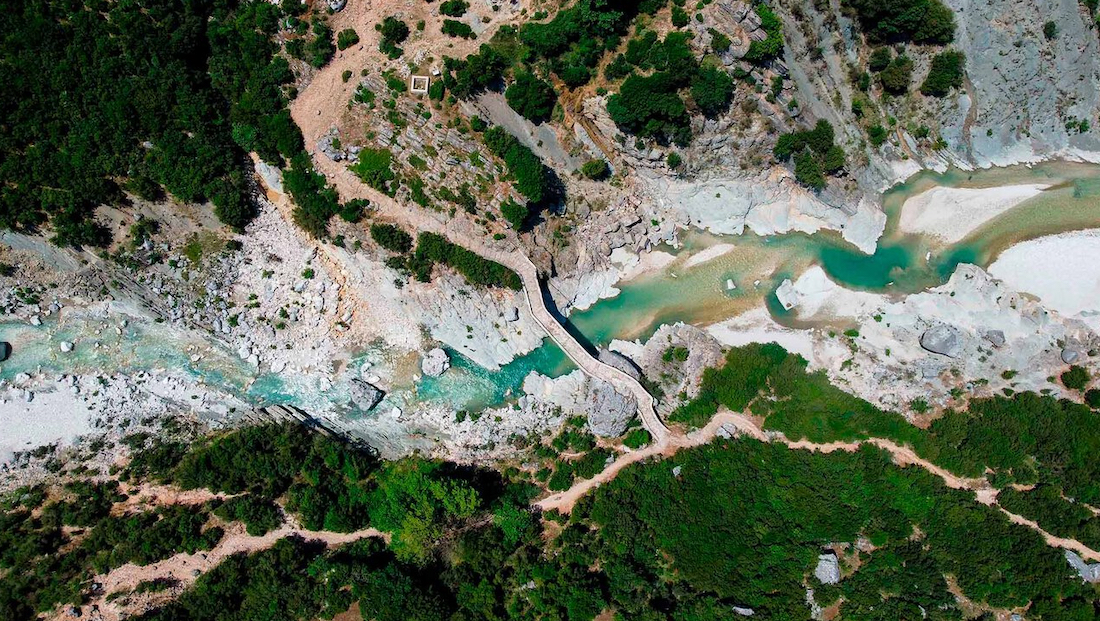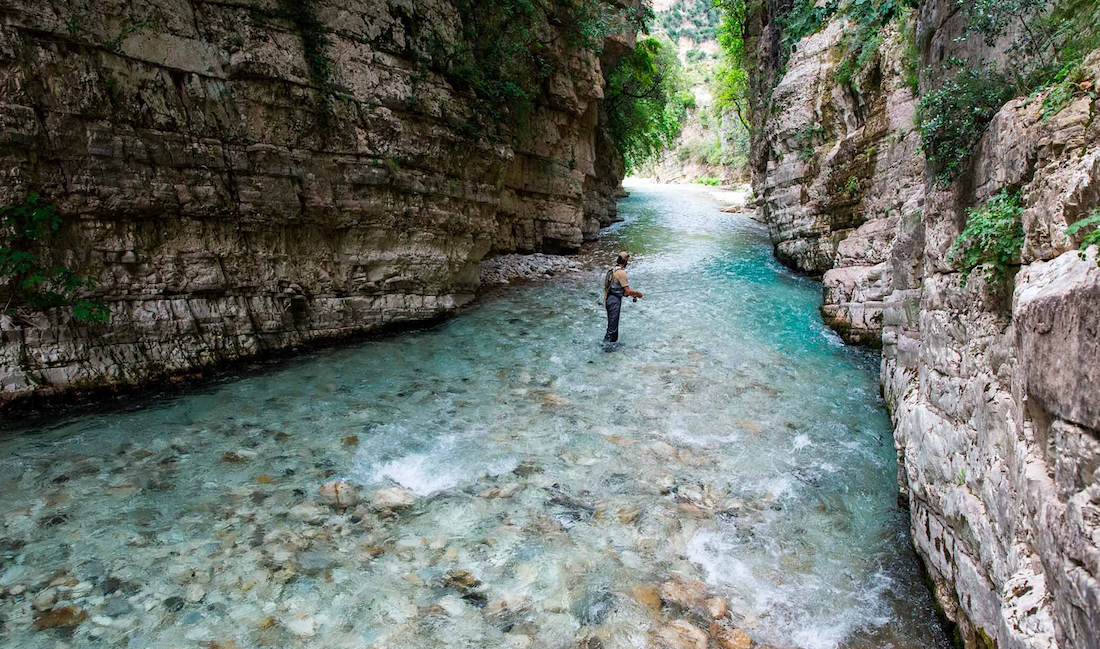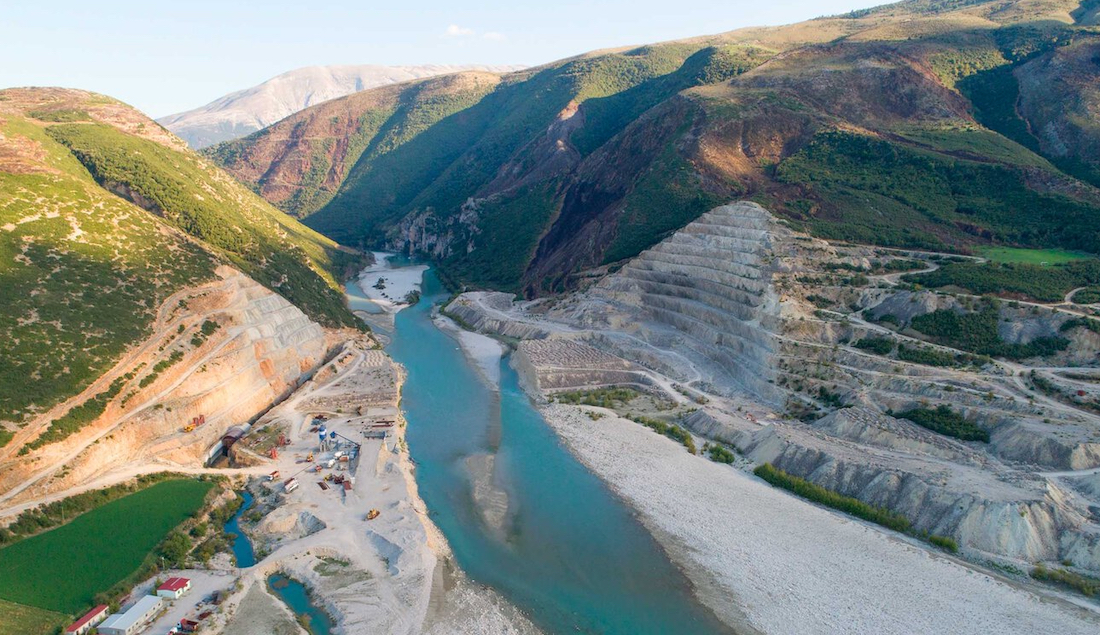On June 13, 2022, the Albanian government signed a Memorandum of Understanding with Patagonia to declare the Vjosa River - one of the last wild rivers in Europe - a National Wild Rivers Park.
Patagonia is one of our favorite brands, and not only because of the sophisticated and ingenious clothing for us fly fishers and outdoor enthusiasts, but also because of the ambitious thinking of the non-profit company in terms of sustainability and climate protection. And on March 13, 2023, the company, with the legal anchoring of the first Wild River National Park in Europe, succeeded in reaching another milestone. With the signing of the declaration of intent and, ultimately, the approval of the law by the Albanian government, Patagonia has succeeded in protecting the Vjosa and three of its main tributaries forever.
 The Shushica River is one of the three tributaries of the Vjosa River protected in Phase 1 of the National Park Declaration
The Shushica River is one of the three tributaries of the Vjosa River protected in Phase 1 of the National Park Declaration
A coalition of civil society, business and government representatives worked to develop this new method of protecting the Vjosa River - with success! The regulations ensure that the river can flow freely and help protect a staggering 1,100 animal species, some of which are newly discovered and 13 of which are threatened worldwide. Not to mention protecting 100,000 people whose livelihoods, culture and way of life have been linked to a wild Vjosa for centuries.
But what actually is a wild river? A wild river like the Vjosa is a stream left to its own devices and 100% free of human constructions. The Vjosa meanders untamed through the Albanian landscape from its source to its mouth into the sea, constantly emptying and regenerating itself. Unfortunately, only about one third of the world's great rivers are free of human obstruction or channelization. The Vjosa is one of the largest in Europe, but hopefully not the last river to stand as an international example of how to properly protect water. The Vjosa River basin makes up a third or more of Albania's land area. It is huge. Phase 1 of the Vjosa Wild River National Park, established on March 15, 2023, covers a long, narrow area of 20,000 hectares with 400 kilometers of protected river course from the Albanian-Greek border to the Adriatic Sea and includes three tributaries. Phase 2 will protect additional tributaries, extend the river's headwaters into Greece, and include other parts of the river basin.
 Also for us fly fishers, the Vjosa and its tributaries are a natural experience without equal.
Also for us fly fishers, the Vjosa and its tributaries are a natural experience without equal.
Albania had particular hurdles to overcome before the government's attention could turn to a river. "After the fall of the communist dictatorship in the 90s, Albania had so many critical problems to solve. In the 90s, we were survivors. After that, in the 2000s and 2010s, we built a state, a democratic society with rule of law, which didn't exist before, and that was crucial for our lives," says Mirela Kumbaro, Albania's minister of tourism and environment, who was previously a professor of intercultural communication before taking a government post in 2013. "But in 2013, we finally had the opportunity to create a vision of what Albania should be like."
It is all the more impressive that all parties have come together and set an international example with the Vjosa National Park, where we can only hope that the Vjosa will not remain the only river in Europe to be protected and able to decide its own path through the landscape. Because in the effort to tame a river by straightening, dams and the like, the actual river is only destroyed and the river itself as well as the native species are not renewable. Like a wild river, nature finds its own way to constantly renew, cleanse and renaturalize itself, and does so without endangering itself. As the Greek philosopher Heraclitus once said, "You never get into the same river twice."
 The last features of a dam that has not been further built thanks to the great effort of all the stakeholders and the protection of the National Park.
The last features of a dam that has not been further built thanks to the great effort of all the stakeholders and the protection of the National Park.
Ryan Gellert, CEO of Patagonia, who has been committed to a free Vjosa since the night he slept on the riverbank in 2016:
"It's been slow and steady, but everyone has committed to listening to each other's problems. It's simple diplomacy, but it works. Let's face it: world leaders are being pressured by citizens and businesses in ways that are unprecedented in history. And we increasingly understand that we all depend on the same living planet. The current lesson from Vjosa is that these things can be done and are worth doing!

 adh-world
adh-world